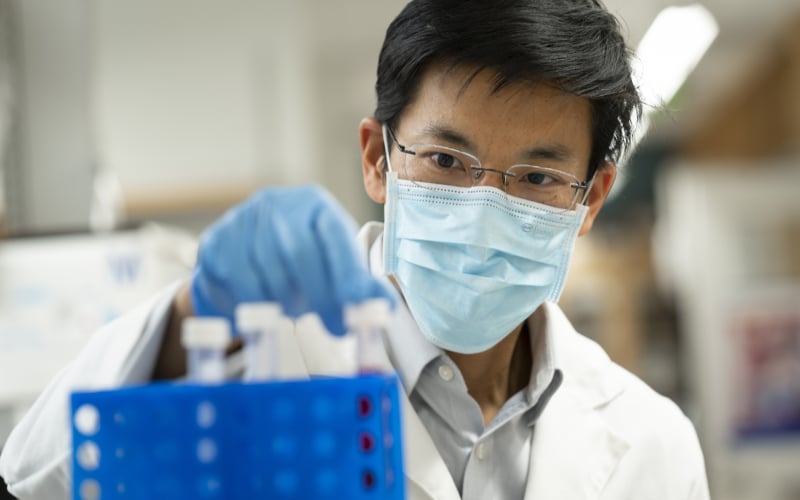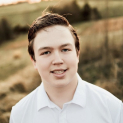
By: Shannon O’Connor
Alex’s Lemonade Stand Foundation (ALSF)-funded researcher Dr. Leo Wang got his start in oncology research by studying acute myeloid leukemia. Now, he is taking his leukemia discoveries and translating that work into the study of immunotherapy as a treatment for brain tumors.
During his initial research, funded by an ALSF Young Investigator Grant, Dr. Wang became fascinated by leukemia stem cells (LSCs) and their ability to resist chemotherapy. Dr. Wang hypothesized that these LSCs caused relapses, common in patients with acute myeloid leukemia (AML). Dr. Wang used protein-focused technologies to understand how LSCs preserve their durable regenerative capacity, known as “stemness.”
That initial work sparked a deep interest in blood cell stemness, leading Dr. Wang to study how blood cells survive and proliferate under hostile conditions. When he moved to City of Hope in 2016, this expertise became very helpful in a new way: he was able to design new strategies to improve the stemness of CAR-T cells – a type of immunotherapy that uses engineered T cells to fight cancer. That research has led to a clinical trial using CAR-T cells to treat children with relapsed or refractory brain tumors.
Leukemia and brain tumors are the two most common types of cancer in children. While treatment options for these cancers continue to improve, not all children survive, and those that do may be left with devastating side effects from harsh treatments. For example, today’s frontline treatment for AML includes high-dose chemotherapy that causes later-term side effects like cardiac dysfunction, hearing loss and organ damage. For brain tumors, the side effects of standard treatment (surgery, radiation therapy, and chemotherapy) also include cognitive, endocrine, and growth impairment. For the most aggressive brain tumors, cure rates have not improved in the past several decades. It’s clear that newer, safer treatments are needed for these diseases.
So far, preliminary results of the brain tumor CAR-T trial are encouraging, and Dr. Wang and his team are optimistic. The trial is currently open to children with any primary malignant brain tumor that expresses the target antigen.
Dr. Wang’s is one of several similar trials in the United States right now, but he doesn’t see that as competition. He sees that as an exciting opportunity to collaborate with other scientists working on the same problem to find the best solution.
“Physicians, scientists, and patients are all working together – we meet regularly with our peers at Stanford, Seattle Children’s, St. Jude’s, and Texas Children’s to discuss best practices and lessons learned, and look forward to welcoming others in the near future,” said Dr. Wang. “Working together and sharing information benefits everyone, most of all patients, and gets us better therapies faster.”
Dr. Wang’s Young Investigator Award also provided him a community of big thinkers – mentors, peers, and friends – which helped accelerate his career and connect his research with other scientists to discover new therapies for all kinds of pediatric cancers. Without early career grants like this, many junior investigators cannot develop an independent track record of research success, making it a challenge to compete for larger grants later on in their careers.
“Early career support for pediatric oncology physician-scientists is a critical lifeline during an incredibly vulnerable time in our careers,” said Dr. Wang. “The support of ALSF has been and continues to be absolutely essential in making better therapies available faster for pediatric cancer patients.”
It has been amazing to Dr. Wang, seeing how much science has advanced in pediatric leukemia treatment in the past 60 years. From his days as a stem cell transplant physician, seeing firsthand how scientists could use healthy blood cells to cure disease, he was inspired to be a catalyst for change himself. “That progress is an intense motivator for me because we haven’t made the same gains in all tumor types,” Dr. Wang said. “We have a tremendous opportunity to bring those same advancements forward for our neuro-oncology patients and their families.”
As a parent himself, Dr. Wang understands that the relationship between a child with cancer, their families, and their doctor is extremely important. Being part of that relationship as a doctor they can trust is a huge part of why he became a pediatric oncologist.
As the clinical trial progresses, Dr. Wang looks forward to using the results to determine how to make these CAR-T cells work better in the future. Ideally, he would like to use this therapy to treat patients across a variety of different diseases.
“I know that we have enormous challenges ahead of us, but I also know that we’re not going to stop until we’ve defeated these terrible diseases,” said Dr. Wang. “Part of the way that we get there is by thinking big and supporting visionary team science. Only a few organizations in the world do this at scale, and Alex’s Lemonade Stand Foundation is one of them.”

